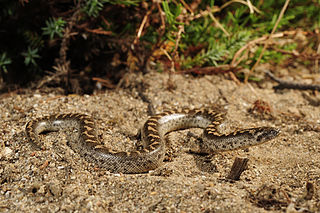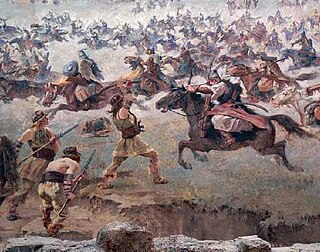Evolutionary psychology is a theoretical approach in psychology that examines cognition and behavior from a modern evolutionary perspective. It seeks to identify human psychological adaptations with regards to the ancestral problems they evolved to solve. In this framework, psychological traits and mechanisms are either functional products of natural and sexual selection or non-adaptive by-products of other adaptive traits.
Sociobiology is a field of biology that aims to explain social behavior in terms of evolution. It draws from disciplines including psychology, ethology, anthropology, evolution, zoology, archaeology, and population genetics. Within the study of human societies, sociobiology is closely allied to evolutionary anthropology, human behavioral ecology, evolutionary psychology, and sociology.

Aggression is a behavior aimed at opposing or attacking something or someone. Though often done with the intent to cause harm, it can be channeled into creative and practical outlets for some. It may occur either reactively or without provocation. In humans, aggression can be caused by various triggers. For example, built-up frustration due to blocked goals or perceived disrespect. Human aggression can be classified into direct and indirect aggression; whilst the former is characterized by physical or verbal behavior intended to cause harm to someone, the latter is characterized by behavior intended to harm the social relations of an individual or group.
Margo Wilson (1942–2009) was a Canadian evolutionary psychologist. She was a professor of psychology at McMaster University in Hamilton, Ontario, Canada, noted for her pioneering work in the field of evolutionary psychology and her contributions to the study of violence.

Sociobiological theories of rape explore how evolutionary adaptation influences the psychology of rapists. Such theories are highly controversial, as traditional theories typically do not consider rape a behavioral adaptation. Some object to such theories on ethical, religious, political, or scientific grounds. Others argue correct knowledge of rape causes is necessary for effective preventive measures.
Uxoricide is the killing of one's own wife. It can refer to the act itself or the person who carries it out. It can also be used in the context of the killing of one's own girlfriend. The killing of a husband or boyfriend is called mariticide.
The Human Behavior and Evolution Society (HBES) is an interdisciplinary, international society of researchers, primarily from the social and biological sciences, who use modern evolutionary theory to help to discover human nature — including evolved emotional, cognitive and sexual adaptations. It was founded on October 29, 1988 at the University of Michigan.
Sex differences in crime are differences between men and women as the perpetrators or victims of crime. Such studies may belong to fields such as criminology, sociobiology, or feminist studies. Despite the difficulty of interpreting them, crime statistics may provide a way to investigate such a relationship from a gender differences perspective. An observable difference in crime rates between men and women might be due to social and cultural factors, crimes going unreported, or to biological factors for example, testosterone or sociobiological theories). The nature or motive of the crime itself may also require consideration as a factor.

A psychological adaptation is a functional, cognitive or behavioral trait that benefits an organism in its environment. Psychological adaptations fall under the scope of evolved psychological mechanisms (EPMs), however, EPMs refer to a less restricted set. Psychological adaptations include only the functional traits that increase the fitness of an organism, while EPMs refer to any psychological mechanism that developed through the processes of evolution. These additional EPMs are the by-product traits of a species’ evolutionary development, as well as the vestigial traits that no longer benefit the species’ fitness. It can be difficult to tell whether a trait is vestigial or not, so some literature is more lenient and refers to vestigial traits as adaptations, even though they may no longer have adaptive functionality. For example, xenophobic attitudes and behaviors, some have claimed, appear to have certain EPM influences relating to disease aversion, however, in many environments these behaviors will have a detrimental effect on a person's fitness. The principles of psychological adaptation rely on Darwin's theory of evolution and are important to the fields of evolutionary psychology, biology, and cognitive science.

Sexual jealousy is a special form of jealousy in sexual relationships, based on suspected or imminent sexual infidelity. The concept is studied in the field of evolutionary psychology.

Richard Walter Wrangham is an English anthropologist and primatologist; he is Professor of Biological Anthropology at Harvard University. His research and writing have involved ape behavior, human evolution, violence, and cooking.
John Tooby was an American anthropologist, who helped pioneer the field of evolutionary psychology with his psychologist wife Leda Cosmides.
In evolutionary psychology, the Cinderella effect is the phenomenon of higher incidence of different forms of child abuse and mistreatment by stepparents than by biological parents. It takes its name from the fairy tale character Cinderella, which is about a girl who is mistreated by her stepsisters and stepmother. Evolutionary psychologists describe the effect as a byproduct of a bias towards kin, and a conflict between reproductive partners of investing in young that are unrelated to one partner.

Evolution and Human Behavior is a bimonthly peer-reviewed academic journal covering research in which evolutionary perspectives are brought to bear on the study of human behavior, ranging from evolutionary psychology to evolutionary anthropology and cultural evolution. It is primarily a scientific journal, but articles from scholars in the humanities are also published. Papers reporting on theoretical and empirical work on other species may be included if their relevance to the human animal is apparent. The journal was established in 1980, and beginning with Volume 18 in 1997 has been published by Elsevier on behalf of the Human Behavior and Evolution Society. The editor-in-chief is Debra Lieberman.
Extra-pair copulation (EPC) is a mating behaviour in monogamous species. Monogamy is the practice of having only one sexual partner at any one time, forming a long-term bond and combining efforts to raise offspring together; mating outside this pairing is extra-pair copulation. Across the animal kingdom, extra-pair copulation is common in monogamous species, and only a very few pair-bonded species are thought to be exclusively sexually monogamous. EPC in the animal kingdom has mostly been studied in birds and mammals. Possible benefits of EPC can be investigated within non-human species, such as birds.

Mark van Vugt is a Dutch evolutionary psychologist who holds a professorship in evolutionary psychology and work and organizational psychology at the VU University Amsterdam, the Netherlands. Van Vugt has affiliate positions at the University of Oxford, Institute for Cognitive and Evolutionary Anthropology (ICEA).

Biosocial criminology is an interdisciplinary field that aims to explain crime and antisocial behavior by exploring biocultural factors. While contemporary criminology has been dominated by sociological theories, biosocial criminology also recognizes the potential contributions of fields such as behavioral genetics, neuropsychology, and evolutionary psychology.

The Evolution of Human Sexuality is a 1979 book about human sexuality by the anthropologist Donald Symons, in which the author discusses topics such as human sexual anatomy, ovulation, orgasm, homosexuality, sexual promiscuity, and rape, attempting to show how evolutionary concepts can be applied to humans. Symons argues that the female orgasm is not an adaptive trait and that women have the capacity for it only because orgasm is adaptive for men, and that differences between the sexual behavior of male and female homosexuals help to show underlying differences between male and female sexuality. In his view, homosexual men tend to be sexually promiscuous because of the tendency of men in general to desire sex with a large number of partners, a tendency that in heterosexual men is usually restrained by women's typical lack of interest in promiscuous sex. Symons also argues that rape can be explained in evolutionary terms and feminist claims that it is not sexually motivated are incorrect.
Todd Kennedy Shackelford is an American psychologist and professor at Oakland University. He is best known for his work in evolutionary psychology. He is the editor in chief of the academic journals Evolutionary Psychology and Evolutionary Psychological Science. He is a fellow of the American Psychological Association and the Association for Psychological Science.

The male warrior hypothesis (MWH) is an evolutionary psychology hypothesis by Professor Mark van Vugt which argues that human psychology has been shaped by between-group competition and conflict. Specifically, the evolutionary history of coalitional aggression between groups of men may have resulted in sex-specific differences in the way outgroups are perceived, creating ingroup vs. outgroup tendencies that are still observable today.








